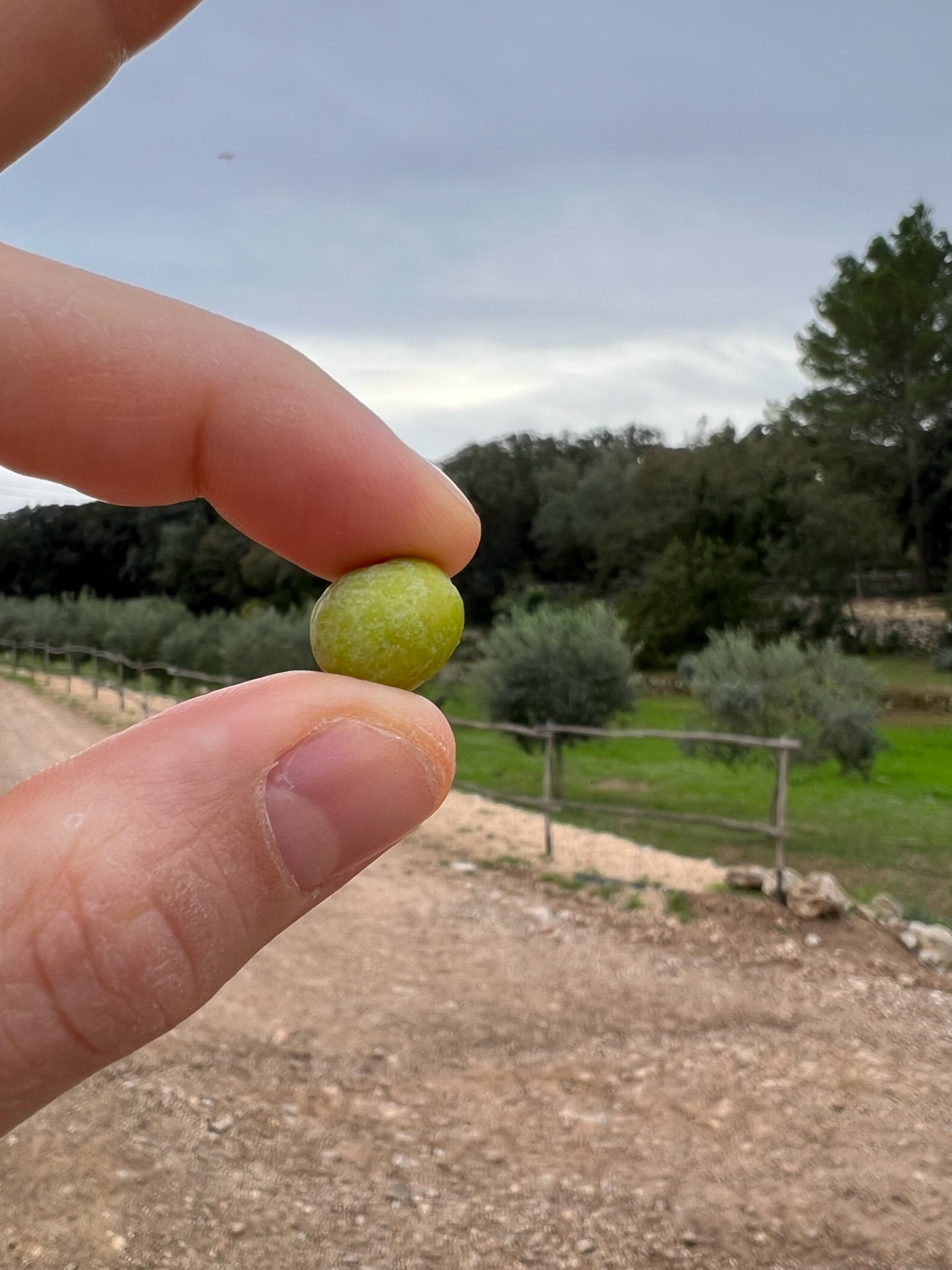An Olive’s Journey
Arbequina olives at one of the trees at LA FINCA
Turning olives into oil
Mallorca, the largest of the Balearic Islands, is known for its stunning beaches, crystal-clear waters, and picturesque villages. Beautiful luxury villas with privates pools and boho-styled fincas await visitors. But it's also home to a thriving olive oil industry.
The island has a long history of olive oil production, dating back to the Phoenicians in the 10th century BC. Today, there are over 1 million olive trees on Mallorca, producing over 2 million litres of olive oil each year. There are different varieties on Mallorca that have become native to the islands.
The small and round Arbequina olive, which we have planted at LA FINCA, are known to be mild and having low acidity.
First Steps
The olive oil production process here in Mallorca is relatively simple, but it requires a lot of care and attention. The olives are typically harvested in autumn, right now to be precise, when they are ripe and have a high oil content. They have beautiful colouring as you can see in the video below. The olives are collected by our workmen by hand into several baskets. To be then transported to the next village, were they will be washed, crushed, and malaxed (kneaded) to extract the oil. The oil is then extracted using a press, a method that is more traditional. Once the oil has been extracted, it is filtered to remove any impurities. Then, we put it into beautiful glass bottles for you to purchase. Have a look at the journey our olives take for you.
The way our olives take to become this healthy and organic oil for any of your dishes!
The different Oil types
There are three main types of olive oil produced in Mallorca: extra virgin olive oil, virgin olive oil, and olive oil.
Extra virgin olive oil is the highest quality olive oil. It is made from the first pressing of the olives and has a low acidity level. Extra virgin olive oil has a strong flavour and aroma, and it is ideal for use in dressings, sauces, and marinades.
Virgin olive oil is made from the second pressing of the olives and has a slightly higher acidity level than extra virgin olive oil. It has a more delicate flavour and aroma than extra virgin olive oil, and it is often used for cooking.
Olive oil is a blend of refined and virgin olive oils. It has a high acidity level and a neutral flavour. Olive oil is often used for frying and baking.
We have chosen this big bottle for our extra virgin olive oil, which is pressed in a little village nearby in traditional manner.
Arbequina Olives
Arbequina olives are a small, round variety of olive that is native to the Catalonia region of Spain. They are now grown in many other parts of the world, including Mallorca, and are one of the most popular varieties of olive used to make olive oil.
Arbequina olives are known for their mild flavour and delicate aroma. They have a low acidity level and a high oil content. Arbequina olive oil has a slightly sweet flavour with hints of fruit and nuts. It is often described as being buttery or creamy.
They are also known for being very productive and easy to grow. They are able to adapt to a variety of climates and soil types. This makes them a good choice for both commercial and backyard growers.
Here are some of the key characteristics of Arbequina olives:
Size: Small, round olives
Colour: Green to black when ripe
Flavour: Mild, sweet flavor with hints of fruit and nuts
Aroma: Delicate aroma
Acidity level: Low
Oil content: High
Productivity: Very productive
Ease of growing: Easy to grow
Arbequina olives are a versatile variety of olive that can be used to make different products, including olive oil, table olives, and tapenade. They are also a popular ingredient in many dishes, such as salads, sauces, and marinades.
How to enjoy Mallorcan olive oil
Here are a few ideas for how to enjoy Mallorcan olive oil:
Drizzle extra virgin olive oil over fresh bread or tomatoes to make Pamboli.
Use olive oil to make a dressing for a salad or pasta dish.
Marinate meat or fish in olive oil and herbs before cooking.
Sauté vegetables in olive oil.
Use olive oil to make a sauce for pasta or rice.
Drizzle olive oil over cooked vegetables or meat.
No matter how you choose to enjoy it, Mallorcan olive oil is a delicious and healthy addition to your diet.
About these healthy fats
Whatever kind, roughly 75% of the oil's content is made up of monounsaturated fatty acids. Monounsaturated fats, when used in place of saturated fats, assist reduce "bad" LDL cholesterol levels. Antioxidant and anti-inflammatory qualities of olive oil have been linked to its health benefits and are therefore an important part of the healthy Mediterranean diet.




